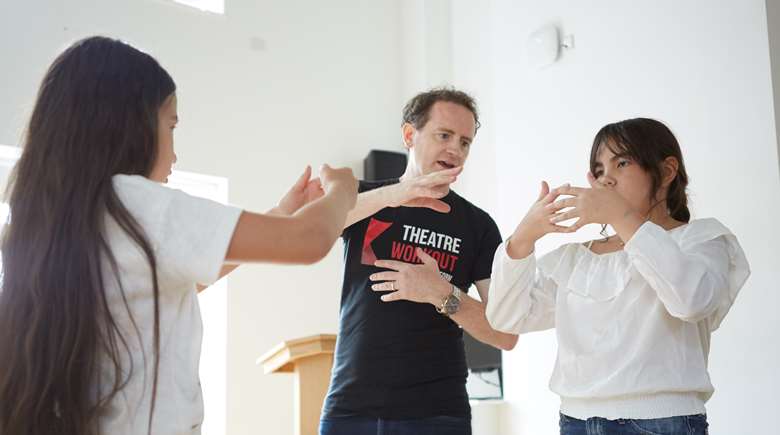Finding allies: The Drama and Theatre Education Alliance
Sarah Lambie
Tuesday, March 1, 2022
All children and young people should have access to high quality drama education. Striving towards this goal, Sarah Lambie introduces the Drama and Theatre Education Alliance, and outlines how you can help.

Theatre Workout
The Drama and Theatre Education Alliance (DTEA) is an alliance of 14 national associations working in drama and theatre with, for and by children and young people. It brings together associations from across the UK, with an aim to offer one voice, and the combined capability to present a united front in lobbying for positive change in the way drama and theatre is factored into the education of people aged 0-25.
Grown from roots that were planted at the Big Arts and Education Debate event at the Birmingham Rep in 2018, the DTEA has created a manifesto calling for every child and young person to have an entitlement to drama and theatre throughout their education.
A manifesto for change
The manifesto begins: ‘Making drama and theatre is an essential part of being human. Participating helps us to express what we care about, and why; reminding us of who we are and what we can be. Drama is a source for cultural capital, identity and heritage; it inspires us to take risks, think critically, and builds social cohesion through collaboration. It can change and shape our lives through developing creativity, cognition, empathy and resilience.
‘The value of learning drama is educational, social, moral and economic, but it is more than the sum of these parts. Children and young people thrive in schools where drama is accessible to all through the curriculum. When they are taught by trained, confident specialist teachers who are recognised and supported, children and young people's creative potential is developed, and their wellbeing strengthened.
‘We are calling for:
- High quality drama teaching to be made a curriculum entitlement for every child and young person
- High quality theatre experiences to be made a cultural entitlement for every child and young person
- Young people to be supported to enter the theatre workforce?
- A world class education workforce and infrastructure in drama and theatre education.’
It then goes on to lay out the ways in which it suggests those aims can be achieved. You can read the manifesto in full on the DTEA website.
The board of the Alliance meets regularly through the year, and I was recently invited to sit in as an observer of one of their meetings. It was an extremely useful insight into the discussions being had among members.
One of the first items on the agenda was representation – in keeping with recent drives to address issues of representation in the drama curriculum, which have themselves been substantially contributed to by individuals who sit within DTEA's member organisations. The DTEA is working to ensure that each of its members’ boards, and thereby, by extension, its own board, are better representative of the diversity of the UK population than they are at present, to ensure that diverse voices are being heard at this very central point.
World Day of Theatre for Children and Young People
The meeting then moved on to the matter of World Day of Theatre for Children and Young People. Celebrated on 20 March, the DTEA wanted to find a way to tie in with this occasion and draw government-level attention to Drama in Education. As such, the Alliance has been encouraging teachers and practitioners to invite their local MP to an event on Friday 18 March – such as one of the following:
- A short performance by children and young people in a school
- A cross curricular drama project in a school
- A drama-centred assembly
- A youth theatre performance in a local theatre or community setting
- A student production (or extract) in a university, perhaps with a local school invited to attend
- A professional performance for children, young people and families in a theatre, school, library or community setting.
This was a pilot event for a wider plan which will aim in the longer term to involve all 533 English MPs.
While 18 March has now passed, the principle of raising awareness need not be confined to a single day in the year. If you are mounting a school production before the end of the school year, have you considered sending a direct invitation (or, even better, one from your student participants) to your local MP? It is very easy to find and write to them, and what better way to show them the benefits of drama in schools than to invite them to see it in practice themselves?
Read the DTEA's manifesto in full, as well as further initiatives, and reports from its member associations, at http://www.dtealliance.co.uk.
DTEA members include:
-
Action For Children's Arts – http://www.childrensarts.org.uk
-
Cultural Learning Alliance – http://www.culturallearningalliance.org.uk
-
London Theatre Young Audiences Forum [A collaboration between the SOLT (Society for London Theatre) and Mousetrap Theatre Projects] – http://www.mousetrap.org.uk
-
London Drama – http://www.londondrama.org
-
London Theatre Consortium – http://www.londontheatreconsortium.com
-
NATD (National Association for the Teaching of Drama) – http://www.natd.eu
-
NAYT (National Association of Youth Theatres) – http://www.nayt.org.uk
-
National Drama – http://www.nationaldrama.org.uk
-
PYA England (a sub-group of Assitej UK) – https://tya-uk.org/
-
SCITED (Standing Committee in Teaching of Education Drama)
-
SCUDD (Standing Conference of University Drama Departments) – http://scudd.org.uk/
-
Theatre Education Forum
To find and invite your local MP to a school production, assembly, or even a drama class, go to http://members.parliament.uk/FindYourMP
Images are courtesy of DTEA members Theatre Workout.


